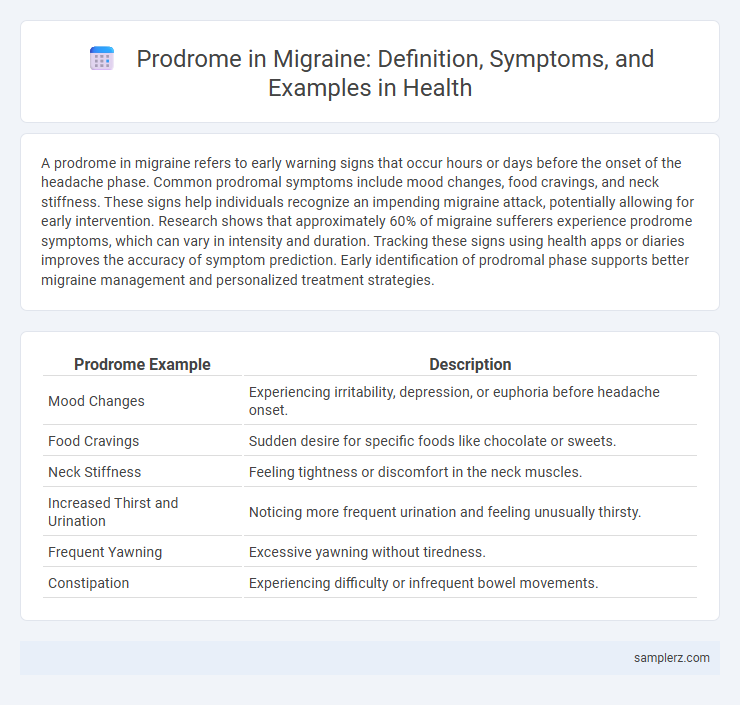A prodrome in migraine refers to early warning signs that occur hours or days before the onset of the headache phase. Common prodromal symptoms include mood changes, food cravings, and neck stiffness. These signs help individuals recognize an impending migraine attack, potentially allowing for early intervention. Research shows that approximately 60% of migraine sufferers experience prodrome symptoms, which can vary in intensity and duration. Tracking these signs using health apps or diaries improves the accuracy of symptom prediction. Early identification of prodromal phase supports better migraine management and personalized treatment strategies.
Table of Comparison
| Prodrome Example | Description |
|---|---|
| Mood Changes | Experiencing irritability, depression, or euphoria before headache onset. |
| Food Cravings | Sudden desire for specific foods like chocolate or sweets. |
| Neck Stiffness | Feeling tightness or discomfort in the neck muscles. |
| Increased Thirst and Urination | Noticing more frequent urination and feeling unusually thirsty. |
| Frequent Yawning | Excessive yawning without tiredness. |
| Constipation | Experiencing difficulty or infrequent bowel movements. |
Understanding Migraine Prodrome: Key Indicators
Migraine prodrome often includes subtle symptoms such as mood changes, food cravings, and neck stiffness occurring hours to days before the headache phase. Common key indicators also encompass yawning, increased urination, and sensitivity to light or sound. Recognizing these early signs allows for timely intervention and better migraine management.
Common Prodromal Symptoms in Migraine Sufferers
Common prodromal symptoms in migraine sufferers include mood changes such as irritability or depression, food cravings, and neck stiffness, often appearing hours or days before the headache phase. Other frequent signs are increased thirst, frequent yawning, and heightened sensitivity to light or sound. Recognizing these early indicators can help initiate timely migraine management and prevent progression to severe pain.
Mood Changes as Early Signs of Migraine
Mood changes such as irritability, depression, or euphoria frequently serve as prodromal symptoms in migraine, often manifesting hours or days before the headache phase. These early mood alterations are linked to neurochemical fluctuations involving serotonin and dopamine pathways in the brain. Recognizing mood changes as early signs can facilitate timely intervention and migraine management.
Food Cravings and Appetite Shifts Before Migraine
Food cravings and appetite shifts often serve as prodromal indicators before a migraine attack, with patients frequently reporting intense desires for specific foods such as chocolate or salty snacks. These dietary urges correlate with neurochemical changes in the hypothalamus, which regulates hunger and may trigger migraine onset. Recognizing these early symptoms allows for timely intervention, potentially mitigating the severity or duration of the migraine episode.
Cognitive Disturbances in the Migraine Prodrome Stage
Cognitive disturbances in the migraine prodrome stage frequently include difficulties with concentration, memory lapses, and slowed mental processing. These symptoms may appear hours or even days before the onset of headache, serving as early neurological warning signs. Recognizing cognitive impairments during the prodromal phase can facilitate timely intervention and improve migraine management strategies.
Sensitivity to Light and Sound: A Prodromal Clue
Sensitivity to light and sound often serves as a prodromal clue in migraines, manifesting hours or even days before the headache phase. This heightened sensory sensitivity indicates early neurological changes, helping patients recognize and potentially manage the impending migraine attack. Identifying these prodromal symptoms allows for timely intervention with preventive treatments to reduce migraine severity.
Gastrointestinal Changes Preceding Migraine
Gastrointestinal changes such as nausea, vomiting, and abdominal discomfort often serve as prodromal symptoms preceding migraine attacks in patients. These early digestive disturbances can manifest hours to days before the onset of headache pain, signaling the initial phase of migraine. Recognizing these gastrointestinal prodromes enables timely intervention and may improve migraine management outcomes.
Fatigue and Sleep Disturbances in Migraine Prodrome
Fatigue and sleep disturbances are common prodrome symptoms in migraine, often occurring hours to days before headache onset. Patients frequently report excessive tiredness, difficulty falling or staying asleep, or oversleeping as early indicators of an impending migraine attack. Recognizing these prodromal signs enables timely intervention to potentially reduce attack severity or frequency.
Neck Stiffness and Muscular Discomfort as Warning Signs
Neck stiffness and muscular discomfort are common prodrome symptoms indicating an impending migraine attack. These warning signs often manifest hours or days before the headache phase, signaling neurological changes and increased muscle tension. Early recognition of these symptoms allows for timely intervention to potentially reduce migraine severity and duration.
Early Recognition of Prodrome for Migraine Management
Early recognition of prodrome in migraine involves identifying symptoms such as mood changes, food cravings, and neck stiffness that occur hours to days before headache onset. Timely detection allows for targeted interventions like medication adjustments and lifestyle modifications to reduce migraine severity. Monitoring prodromal signs enhances proactive migraine management and improves patient quality of life.

example of prodrome in migraine Infographic
 samplerz.com
samplerz.com